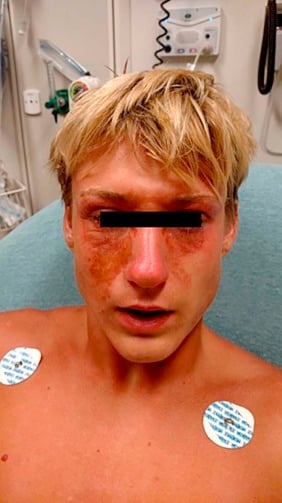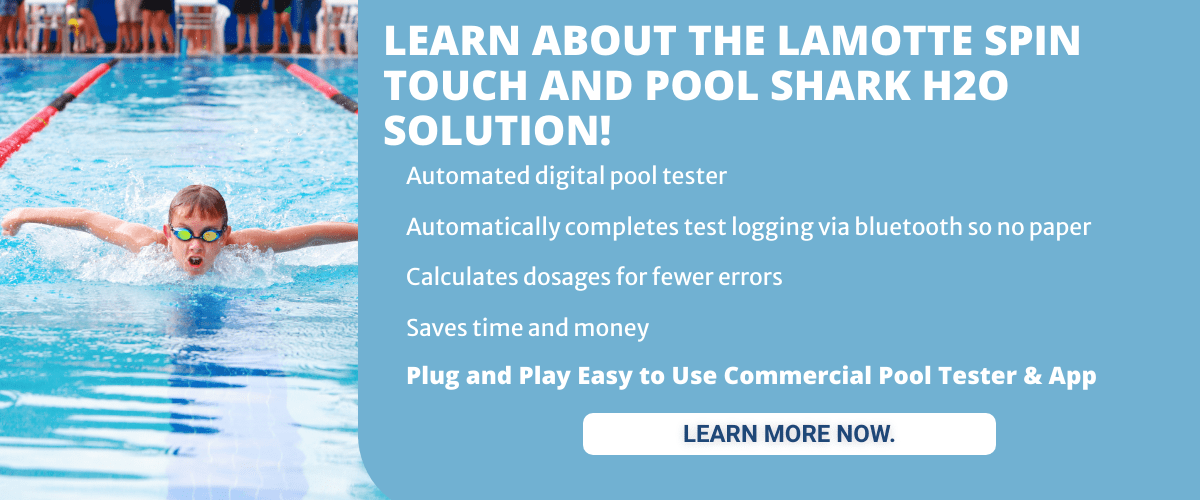Why Do We Need Accurate Swimming Pool Chemical Logs?
First off, it’s the law in most places. Understanding the potential implications to you personally and to the business that manages or owns a commercial swimming pool or spa that is not in compliance will be discussed later in this article. But be forewarned, the penalties for improper management of a commercial swimming pool or spa can be severe.
The Department of Health in most states now requires someone on your team to become a certified pool operator (CPO) and to test and log the water chemical levels at a minimum once a day. Anyone can do a water chemical test, however, in most cases a CPO is required to add the chemicals. Depending on where you are located, you may be required to test the water chemicals hourly so check your state and county regulations. Not testing the water can result in fines or having your pool/spa shut down.
Think of your pool chemical logs as a critical insurance policy. If someone gets sick while they are staying at your facility or comes down with a rash and claims it was due to the pool or spa, your logs are your only proof of proper maintenance.
There is no other way to look back in time and see what the chemical levels were on a given day. THIS alone is why you want your team to keep accurate logs. How long to keep these pool logs varies from state to state. For liability reasons, you probably want to keep them until the statute of limitations expires in your state.
How can I tell if my staff is actually testing the water and keeping accurate logs?
In most cases, it’s really easy to tell that someone is forging a log book just by looking at it. As the leading commercial pool and spa management system, we have access to over 30,000,000 test results. This allows us to spot risk factors in the patterns of data that we see.
Here are some indicators that something is not right with your pool or spa testing regime:
- The chemical logs are filled out for tomorrow, next week (insert future day here)
- Logs are filled out on days your facility is closed or when staff are not working.
- Chlorine readings are the same, test after test, day after day.
- Free Chlorine and Total Chlorine readings are the same in multiple tests. This rarely happens. The free chlorine and total chlorine can actually be the same but typically it’s only after they shock the pool. If these readings are the same, the staff most likely isn’t testing both which is costing your facility money in wasted chemicals, and potentially affecting the health of your bathers.
A commercial-quality pool test kit will very rarely give you the same exact numbers even if you test the same pool water twice in a row. If it does, check to make sure it meets the department of Health requirements and check to make sure the reagents are not expired. If in doubt, get a new test kit. The NSF/ANSI Level 1 test kits as specifically required by new Florida regulations are most accurate and generally easiest to use.
Here are two visual examples of actual pool logs. Can you spot the potential forged log?
I don’t have time to go to the pump room and inspect these logs every day. I have jobs too!
We get it, running a business catering to the public is hard and you have a gazillion tasks. This is exactly why we created the Pool Shark H2O system! No kidding, as a commercial swimming pool operator, we needed it first before you even heard about it. We quickly grew tired of trying to track down and maintain paper pool logs.
Pool Shark H2O lets your maintenance team enter the water chemical tests into their mobile device. It does all the chemical dosing calculations and lets them know how much, if any, chemicals need to go in the water to keep it clean and safe. The results are date time-stamped and cannot be edited. Records are stored securely in the cloud so they can’t get lost or destroyed.
Remember this is your ‘insurance’ so this is important. You can inspect the logs remotely and download a copy at any time. Print out the health department sign with the QR code and hang it in the pump room to make inspections even easier.
Wait, but they can still enter false readings!
Yes, that is true. If people are motivated to neglect the pool they will find a way. Your team can copy readings from yesterday or the day before. However, if they don’t record a test every 24 hours you will be notified. Not testing your pool or spa frequently is going to cost you more money than necessary. After reading this article, you also know what to look for in the log book, and what inspectors look for, to tell if a pool or spa is being tested correctly. An incorrect pool chemical log will not only increase your liability it will cost your company money in wasted chemicals, and increased equipment maintenance. After all, if they aren’t testing the water they won’t know something is wrong until AFTER it happens and that’s not a position most of us like to be in if we can help it.
The consequences for improper maintenance of commercial pool chemistry can be severe!!
Pool Chemical Burns to Toddler Result in Maintenance Worker Arrested for Forging Pool Chemical Logs
A maintenance worker was arrested in South Carolina after falsifying the Department of Health required pool chemical logs on a day he was not working. Unfortunately for everyone, that day a 3-year-old received severe pool chemical burns from the chlorine in the pool. When the Department of Health was called and tested the pool chemicals, they found chlorine levels greatly exceeding what is allowed in the state.

Image Courtesy Science Direct
$26 million dollar settlement against resort for pool chemical burns received by a toddler in the pool!
The Myrtle Beach Hotel paid a heavy price for forging their pool chemical logs in 2020. This settlement, in 2024, just enforces the point that all pools and spas should have their water chemicals tested before they are opened to the public. As with anything mechanical, things can go wrong quickly and when chemicals are involved it can get out of control fast.
Don’t be next!
Whether you manage an apartment, hotel, campground, or golf club, the swimming pool and spa are likely your biggest liability. Unfortunately, pools and spas are often overlooked and take a back seat to dripping faucets, broken door locks, cutting the lawns in front of the office, etc. While all those things are important, leaving them for tomorrow probably isn’t going to cause bodily harm to several guests and potentially close your business. Pool chemical burns, legionella, cryptosporidium (crypto) and rashes are just some of the issues guests can encounter in pools and spas that are not properly maintained. As mentioned before, most states now require a person to test the pool chemical levels manually at least once a day or more depending on usage. Some require these tests hourly for spas.
Pools have become a symbol of a high-class facility, however, they can just as easily bankrupt your business if something goes wrong. Make sure your team is testing the water chemicals before they open the gate to the public.
Don’t Open The Pool If:
- Pool - Free Chlorine level is not at least 1.0ppm ( 2.0ppm if stabilizer(CYA) is used )
- Spa - Free Chlorine level is not at least 3.0ppm
- If your pool chemicals have not been tested that day, DON’T open the pool
- On Saturday and Sunday - if your maintenance team is not working and no one is testing the water chemicals DON’T OPEN THE POOL/SPA.
In most cases, your team can easily correct the low levels of chlorine by adding the correct dosage and testing again in 30 minutes. Once the chlorine has reached your state health department minimums the pool/spa can be opened, unless there are other safety issues.
The Center for Disease Controls Model Aquatic Health Code guidelines recommend not opening a pool until the pH is between 7.2 ppm and 7.8 ppm. For pools the chlorine levels should be above 1.0 ppm and less than 10.0 ppm unless the pool is using stabilized chlorine (Dichlor or Trichlor or Cyanuric Acid) then the minimum recommended level is 2.0 ppm. Spas using chlorine should not be open until the levels are at 3.0 ppm and less than 10.0 ppm.
To learn more about commercial pool logs and your options, check out our guide here.
You can learn about commercial digital pool tester options here.



